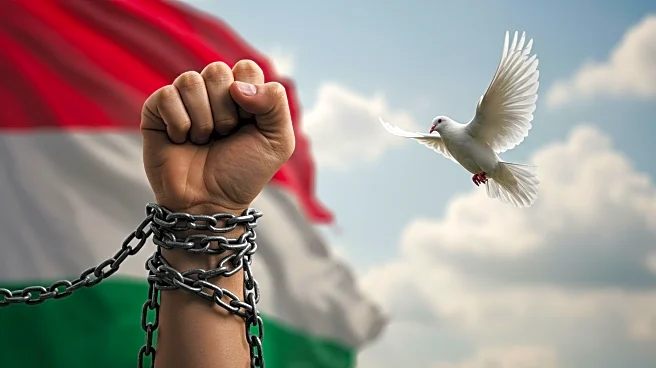What's Happening?
The families of Israelis held hostage in Gaza have announced a nationwide day of disruption scheduled for Tuesday, marking the 690th day since 51 hostages were taken. This initiative, organized by the October 7 Families Forum, follows a previous large-scale protest that drew tens of thousands into the streets. The families accuse Prime Minister Benjamin Netanyahu of obstructing negotiations and are calling for mass participation to demand immediate action for the hostages' release. The planned events include solidarity gatherings across the country, a march from Tel Aviv’s Savidor Central train station, and a rally at Hostages Square. The families emphasize that the government is disconnected from its citizens and that public solidarity is crucial to bring the hostages home.
Why It's Important?
This protest highlights the ongoing tension between the Israeli government and its citizens regarding the handling of hostage negotiations. The families' accusations against Prime Minister Netanyahu suggest a significant public dissatisfaction with the government's approach, potentially impacting his political standing. The protest underscores the broader societal demand for accountability and action, reflecting a deep-seated frustration that could influence future political dynamics in Israel. The situation also draws international attention to Israel's internal challenges, potentially affecting its diplomatic relations and public image.
What's Next?
The upcoming protest is expected to intensify pressure on the Israeli government to prioritize the hostages' release. If the protest garners significant public support, it could lead to increased scrutiny of the government's negotiation strategies and potentially force a shift in policy. The families' call for solidarity may also inspire similar movements, amplifying the demand for governmental transparency and action. The outcome of this protest could set a precedent for how civil society can influence government decisions in Israel.
Beyond the Headlines
The protest raises ethical questions about the balance between political considerations and humanitarian responsibilities. It also highlights the cultural ethos of Israeli society, which values collective action and solidarity in times of crisis. The families' movement may inspire a broader discourse on the role of citizen activism in shaping national policies, potentially leading to long-term shifts in how the Israeli government engages with its populace during crises.









